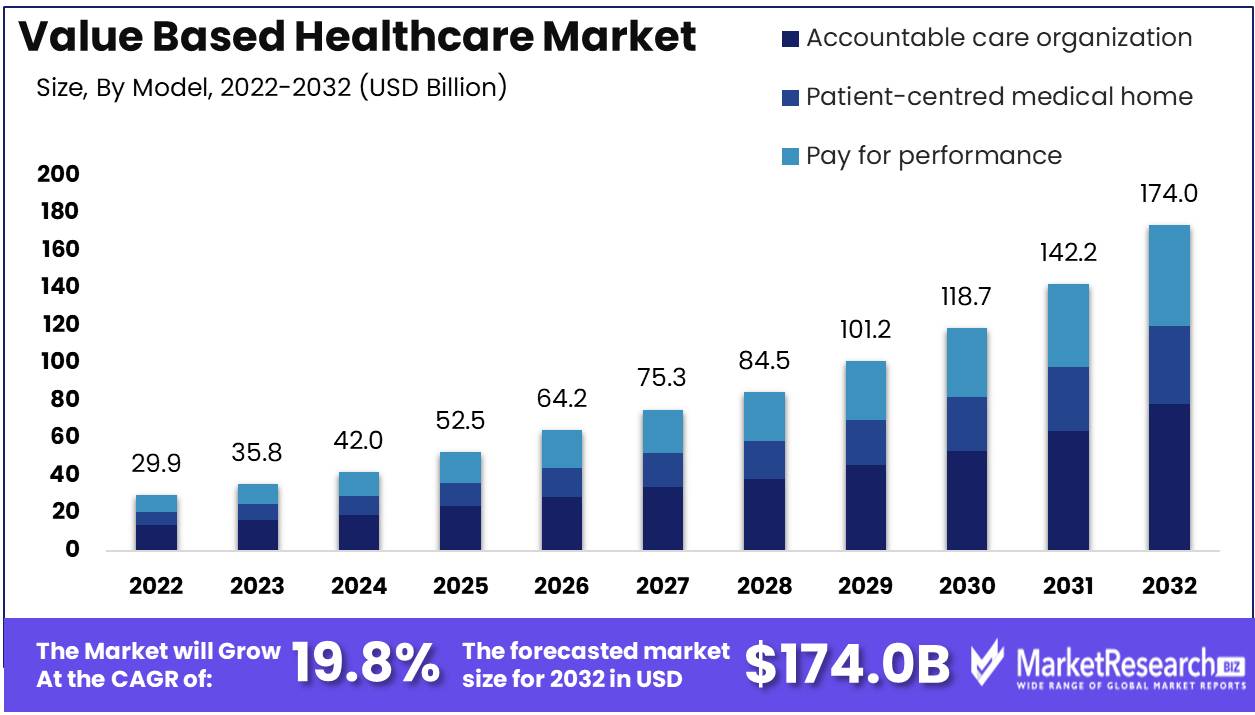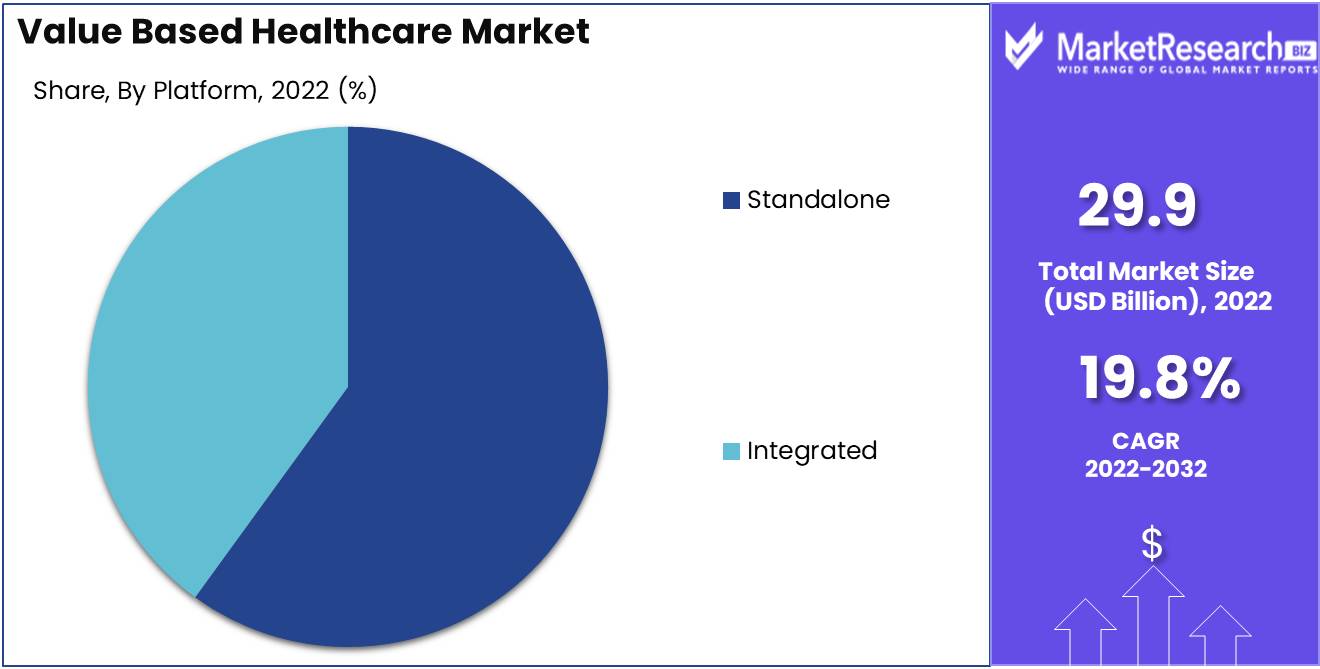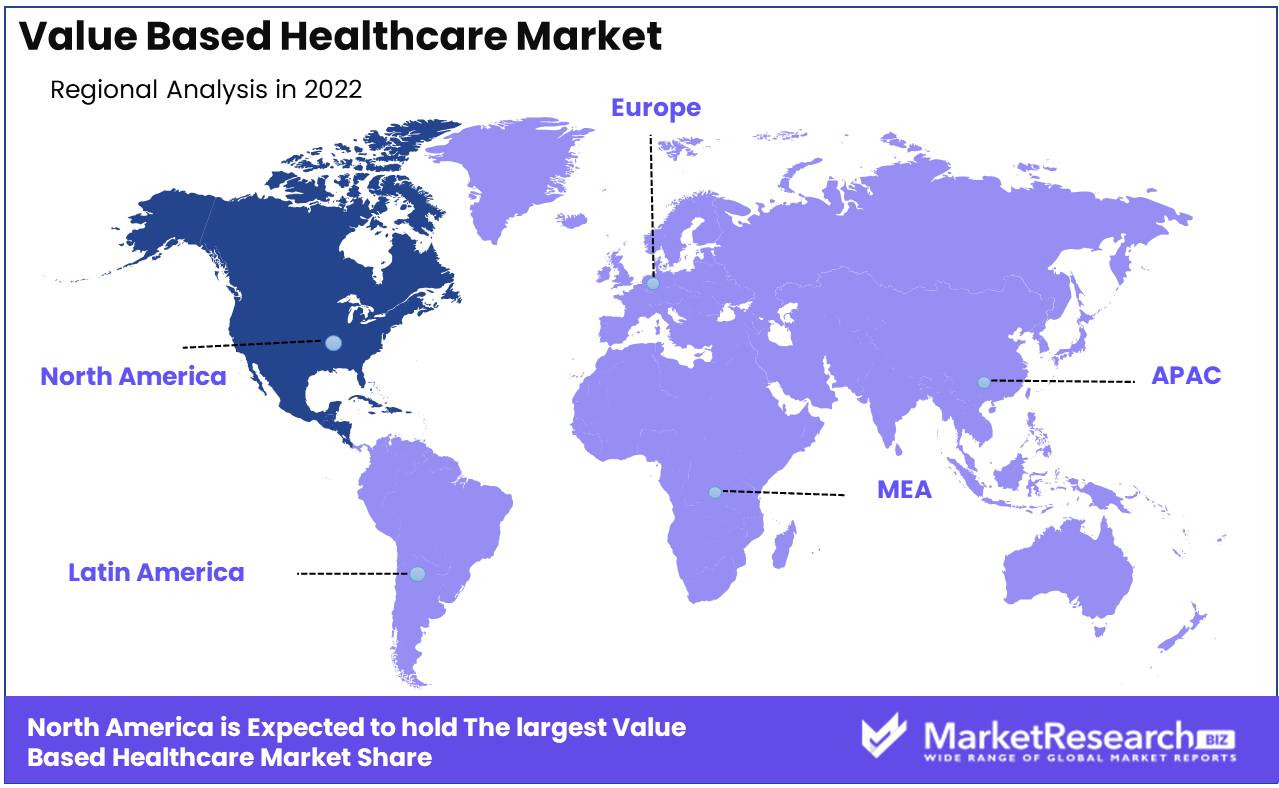
Value Based Healthcare Market By Model (Accountable care organization, Patient-centred medical home, Pay for performance), By Platform (Standalone, Integrated), By Deployment (Cloud-Based, On-Premise), By Application (Hospitals, Clinics, Insurance companies, Government), By Region And Companies - Industry Segment Outlook, Market Assessment, Competition Scenario, Trends, And Forecast 2023-2032
-
39554
-
July 2023
-
152
-
-
This report was compiled by Correspondence Linkedin | Detailed Market research Methodology Our methodology involves a mix of primary research, including interviews with leading mental health experts, and secondary research from reputable medical journals and databases. View Detailed Methodology Page
-
Quick Navigation
Report Overview
Value Based Healthcare Market size is expected to be worth around USD 174.0 Bn by 2032 from USD 29.9 Bn in 2022, growing at a CAGR of 19.8% during the forecast period from 2023 to 2032.
In an ever-changing healthcare environment, value-based healthcare has emerged as a revolutionary concept that seeks to improve patient outcomes while optimizing costs. This article provides a comprehensive overview of the Value Based Healthcare Market, illuminating its definition, objectives, significance, benefits, notable innovations, major investments, growth, applications, industries investing in it, major drivers, ethical concerns, responsible value-based healthcare practices, emphasis on transparency, explainability, and accountability, business applications, and real-world examples.

Value-based healthcare can be defined as a model of healthcare delivery that transfers the emphasis from the quantity of services provided to the quality and value delivered to patients. The primary objective of value-based healthcare is to improve patient outcomes, increase patient satisfaction, and reduce costs by aligning provider incentives with patient outcomes. This model focuses on treating patients based on their healthcare requirements, as opposed to invoicing for individual services.
The ability to incentivize preventive care and early intervention is one of the main advantages of value-based healthcare. By rewarding providers for keeping patients healthy and preventing the onset of disease, value-based healthcare promotes a proactive, rather than a reactive, approach to healthcare. This transition in emphasis from treatment to prevention can result in long-term improvements in patient outcomes and cost savings.
In recent years, the Value Based Healthcare Market has seen a number of noteworthy innovations. The adoption of electronic health records (EHRs) and the use of predictive analytics and artificial intelligence (AI) in healthcare decision-making have revolutionized the delivery of healthcare. EHRs have facilitated the seamless sharing of patient information, which has enhanced care coordination and patient outcomes. AI and predictive analytics have improved diagnostic accuracy, leading to more targeted and individualized treatments.
The incorporation of value-based healthcare into products and services has attracted substantial investment. Healthcare organizations have invested in technologies and systems that measure patient outcomes and evaluate healthcare providers based on these outcomes. These investments have resulted in the development of value-based payment models, such as integrated payments and shared savings programs, which incentivize healthcare providers to deliver high-quality care at optimal costs.
Driving factors
focused on the patient and their outcomes
The Value Based Healthcare Market is undergoing a significant shift toward patient-centered care and outcomes. This change emphasizes the importance of putting patients at the center of their healthcare journey, with a focus on their requirements, preferences, and desired outcomes. Healthcare professionals are now aware that providing high-quality care involves more than just treating medical conditions; it also requires actively engaging patients, empowering them to make informed decisions, and involving them in the decision-making process.
Healthcare quality and cost-effectiveness
There is a growing emphasis on achieving cost-effectiveness and quality in healthcare in light of rising healthcare costs and the need to enhance the quality of care provided. In the Value Based Healthcare Market, providers are incentivized based on their ability to provide high-quality care at a lower cost, thus promoting the efficient use of healthcare resources. The quality of healthcare is determined by multiple factors, including patient outcomes, process efficacy, patient safety, and patient satisfaction. Providers can identify areas for improvement, optimize care delivery processes, and improve patient outcomes by employing evidence-based practices, implementing quality improvement initiatives, and utilizing healthcare data analytics.
Healthcare technology and data analytics
Healthcare delivery, monitoring, and evaluation have been revolutionized by advancements in healthcare data analytics and technology. Value Based Healthcare Market relies heavily on the availability and efficient utilization of healthcare data to generate evidence-based decisions and optimize care delivery. In healthcare, data analytics allows providers to analyze large datasets, identify trends, patterns, and correlations, and make informed decisions regarding patient care, resource allocation, and performance enhancement. Utilizing the strength of data analytics outsourcing, healthcare organizations can gain valuable insights into patient populations, identify high-risk patients, and develop targeted interventions to enhance health outcomes.
Preventive Care and Management
Value Based Healthcare Market recognizes the importance of preventive care and population health management for reducing healthcare costs and improving overall health outcomes. Prevention is a fundamental aspect of healthcare because it endeavors to identify and mitigate health risks at an early stage, thereby reducing the need for expensive interventions and hospitalizations. Population health management involves identifying and addressing health disparities, promoting health equity, and ensuring that healthcare resources are distributed optimally across various populations. By focusing on population health, healthcare organizations are able to implement targeted interventions, improve health outcomes on a larger scale, and reduce healthcare disparities.
Reimbursement Mechanisms and Payment Reforms
As Value Based Healthcare Market evolves, new reimbursement models and payment reforms are being implemented. Traditional fee-for-service reimbursement models, which rewarded volume-based care, are being replaced by value-based reimbursement models that emphasize the quality and outcomes of the care provided. Value-based reimbursement models align incentives with desired outcomes, rewarding healthcare providers for providing high-quality care, improving patient outcomes, and lowering healthcare costs.
Restraining Factors
Data Interoperability/Standardization Issues
Data interoperability and standards may hinder the deployment of a value-based healthcare system. As we move toward a patient-centric approach, seamless access to accurate and complete patient data across healthcare practitioners and systems is essential. However, the healthcare business has several different electronic health record (EHR) systems with different formats. Lack of standards makes data interchange and integration difficult, fragmenting patient information. This inhibits decision-making and coordinated care.
Change and Adoption Reluctance
Healthcare providers, managers, and patients may oppose change, which might slow value-based healthcare implementation. Value-based models need a fundamental shift in mentality and procedures, which might be greeted with resistance and hesitation. Healthcare practitioners are used to getting paid for services rather than results under the fee-for-service paradigm. This promotes quantity over quality. Value-based approaches emphasize value generation, patient outcomes, preventative care, and community health management.
Potential Regulatory and Policy Complexities
Regulatory and policy hurdles may slow value-based healthcare implementation. Regulatory frameworks and regulations must be modified to reflect value-driven healthcare systems. Transparency in reporting quality measurements, value-based reimbursement schemes, and performance standards creates regulatory difficulties. To avoid patient care disruptions during policy and regulatory changes, government, payers, healthcare providers, and other stakeholders must work together.
Patient Outcomes
Value-based treatment must account for patient outcomes and preferences. Patients have distinct healthcare requirements, preferences, and socioeconomic influences. Variability can make establishing treatment practices, creating effective interventions, and assessing results difficult. Healthcare practitioners may struggle to customize patient care plans. Age, gender, lifestyle, and underlying comorbidities might affect the efficacy of medical treatment choices. Cultural, social, and regional variables may influence patient expectations.
Healthcare Infrastructure Issues
Value-based healthcare requires strong infrastructure and resources. However, healthcare infrastructure constraints might prevent value-based treatment from growing. Healthcare infrastructure, especially in neglected areas and developing nations, may lack buildings, technology, and experienced workers. Lack of infrastructure and resources might impair data gathering, care coordination, and access to specialist treatments.
Transforming Healthcare
Addressing the following barriers is critical as the value-based healthcare sector grows. We can advance the value-based healthcare industry by tackling data interoperability and standards, opposition to change and acceptance, regulatory difficulties, patient variances, and infrastructural constraints. Value-based care needs collaboration between providers, payers, policymakers, and patients. Aligning incentives, improving rules, encouraging openness, and adopting new technology can lead to a healthcare system that prioritizes value, results, and patient pleasure.
Model Analysis
Accountable care organization Segment dominates Value Based Healthcare Market. The Value Based Healthcare Market has been rapidly evolving with the emergence of various segments, but one segment that has stood out in recent years is the accountable care organization (ACO) segment. ACOs have gained significant traction in the market due to their ability to deliver high-quality care at lower costs. ACOs are groups of healthcare providers, including hospitals, physicians, and other healthcare professionals, that come together to provide coordinated care to a defined population of patients. These organizations are responsible for the overall care and outcomes of their patients, and they are held accountable for the costs and quality of care they deliver.
Consumer trends and behaviors play a crucial role in shaping the adoption and growth of the ACO segment in the Value Based Healthcare Market. Consumers today are becoming more informed and proactive in managing their healthcare, and they are increasingly seeking value and quality in the care they receive. ACOs align well with these consumer trends and behaviors. ACOs place a strong emphasis on patient engagement and empowerment, involving patients in decision-making and care management processes. This patient-centered approach resonates well with consumers who are looking for healthcare providers that prioritize their needs and preferences.
Platform Analysis
Standalone Segment dominates Value Based Healthcare Market. While the ACO segment has been dominating the Value Based Healthcare Market, another segment that warrants attention is the standalone segment. Standalone healthcare providers, such as independent physician practices and ambulatory surgery centers, have also made significant strides in the value-based healthcare landscape. The dominance of the standalone segment can be attributed to its ability to provide specialized and personalized care. Standalone providers often have a niche focus or expertise in a particular area of healthcare, allowing them to deliver highly specialized services to their patients.
Consumer trends and behaviors have played a significant role in shaping the adoption and growth of the standalone segment in the Value Based Healthcare Market. Consumers today are increasingly seeking specialized and personalized care, and they are willing to go the extra mile to find providers that offer these services. Standalone providers resonate with these consumer trends and behaviors by offering highly specialized and personalized care. Consumers are often willing to travel long distances and pay higher out-of-pocket costs to receive care from providers who have a reputation for delivering exceptional outcomes in their area of expertise.

Key Market Segments
By Model
- Accountable care organization
- Patient-centred medical home
- Pay for performance
By Platform
- Standalone
- Integrated
By Deployment
- Cloud-Based
- On-Premise
By Application
- Hospitals
- Clinics
- Insurance companies
- Government
Growth Opportunity
Artificial Intelligence (AI) and Machine Learning (ML)
Integration of artificial intelligence (AI) and machine learning (ML) technologies is one of the numerous growth opportunities offered by the Value Based Healthcare Market. These cutting-edge technologies have the potential to revolutionize healthcare and enhance patient outcomes. By employing AI and ML, healthcare providers can mine enormous quantities of medical data for meaningful insights and provide individualized care. Integrating such technologies into value-based care models can substantially improve care's efficacy, precision, and quality, thereby improving patient experiences and lowering costs.
Expansion of Telehealth and Virtual Care Services
The pervasive adoption and expansion of telehealth and virtual care services represents a further growth opportunity in Value Based Healthcare Market. In an era where remote accessibility and convenience are of the utmost importance, telehealth provides an innovative method for delivering healthcare. Patients can receive virtual consultations, remotely monitor their health, and gain access to personalized healthcare resources by leveraging digital platforms. The incorporation of telehealth into value-based care models enables timely interventions, increased patient engagement, and enhanced care coordination.
Leveraging Big Data Analytics
Expansion of the use of big data analytics represents a substantial expansion opportunity for value-based healthcare. With the proliferation of electronic health records and health information exchange systems, a massive quantity of healthcare data is generated every day. By leveraging the power of big data analytics, healthcare organizations can analyze patterns, recognize trends, and make proactive decisions to enhance healthcare quality and reduce costs. Using predictive analytics, providers can identify high-risk patients, intervene early, and promote preventive care services, thereby contributing to the expansion and success of value-based care models.
Personalized Medicine and Comprehensive Care
On Value Based Healthcare Market, personalized medicine and precision healthcare represent emergent growth opportunities with enormous potential. Significant progress has been made in genomics and genetic testing, allowing healthcare providers to tailor treatment based on an individual's genetic composition. Personalized medicine becomes an essential component of value-based care models as our understanding of the relationship between genetic variations and health outcomes grows. This strategy enables targeted treatments, prevents superfluous interventions, and promotes the efficient allocation.
Latest Trends
Accountable Care Organizations and Care Management Programs
Accountable Care Organizations (ACOs) and care management programs have grown in popularity as healthcare providers and insurers aim to improve patient outcomes and save costs. ACOs are organizations of hospitals, physicians, and other healthcare providers that coordinate treatment for a specific patient population. Proactive and integrated care management, smooth care transitions, and patient participation are these organizations' goals. ACOs have reduced healthcare costs and improved patient satisfaction and outcomes.
Population Health Management and Health Analytics Tools
Data-driven decision-making and optimized care delivery are becoming more important to healthcare businesses as value-based care becomes more prevalent. Population health management and health analytics are significant in this regard. These technologies let healthcare clinicians to evaluate enormous amounts of data, find trends, identify hazards, and devise focused interventions to enhance patient outcomes and minimize costs. Healthcare institutions may identify high-risk patients, take preventative actions, and provide individualized treatment by using data.
Use of Telehealth and Remote Monitoring Technologies
Technology has made telehealth and remote monitoring possible, changing healthcare delivery. Telehealth ensures timely care for rural and disabled patients by connecting them to healthcare providers remotely. However, remote monitoring technologies allow healthcare personnel to remotely monitor patients' vital signs and health metrics, enabling early intervention and proactive care management. During the COVID-19 pandemic, these tools have helped patients obtain required treatment while avoiding viral exposure.
Reimbursement and Pay-for-Performance Models
Traditional fee-for-service compensation schemes reward quantity over quality, resulting in fragmented treatment and needless healthcare use. This is driving outcome-based reimbursement and pay-for-performance approaches. These approaches encourage clinicians to produce high-value treatment and achieve favorable patient outcomes by linking payment to quality and results. By connecting financial incentives with quality and value, healthcare companies are encouraged to improve treatment delivery, patient experience, and population health.
Precision Healthcare and Personalized Medicine
Personalized medicine and precision healthcare have grown due to genetics, medical technology, and data analytics. Patients' genetic composition, lifestyle, and environmental variables are taken into account to create personalized treatment programs. Precision healthcare uses data to forecast illness development, identify risk factors, and provide focused therapies. Healthcare organizations may improve diagnosis, therapy choices, and results by adopting these methods.
Regional Analysis
North America leads value-based healthcare. Value-based healthcare is transforming healthcare by focusing on quality treatment, patient outcomes, and cost reduction. With its sophisticated infrastructure, technology, and healthcare models, North America leads the value-based healthcare sector. Value-based healthcare has grown globally in recent years. Value-based care, which prioritizes quality and efficiency, is replacing the fee-for-service approach, which promotes volume.
North America leads the value-based healthcare sector in this paradigm change. This revolutionary trend is spearheaded by the region's strategic commitment to value-based care and its substantial healthcare resources.
North America's superior healthcare infrastructure helps it dominate value-based healthcare. The region has cutting-edge medical facilities, technology, and a powerful healthcare network. Healthcare businesses may smoothly embrace value-based care models and align their systems to maximize patient outcomes. Thus, North American patients receive better treatment, fewer medical mistakes, and higher-quality healthcare.
North American healthcare stakeholders—physicians, hospitals, payers, and regulators—collaborate well. This collaboration promotes value-based care program success and sustainability. North America has fostered cooperation, shared best practices, and aligned incentives to achieve value-based healthcare goals including improved patient experience, population health, and lower healthcare costs.

Key Regions and Countries
North America
- US
- Canada
- Mexico
Western Europe
- Germany
- France
- The UK
- Spain
- Italy
- Portugal
- Ireland
- Austria
- Switzerland
- Benelux
- Nordic
- Rest of Western Europe
Eastern Europe
- Russia
- Poland
- The Czech Republic
- Greece
- Rest of Eastern Europe
APAC
- China
- Japan
- South Korea
- India
- Australia & New Zealand
- Indonesia
- Malaysia
- Philippines
- Singapore
- Thailand
- Vietnam
- Rest of APAC
Latin America
- Brazil
- Colombia
- Chile
- Argentina
- Costa Rica
- Rest of Latin America
Middle East & Africa
- Algeria
- Egypt
- Israel
- Kuwait
- Nigeria
- Saudi Arabia
- South Africa
- Turkey
- United Arab Emirates
- Rest of MEA
Key Players Analysis
Koninklijke Philips N.V., also known as Philips, is a prominent multinational conglomerate that specializes in a number of industries, including healthcare. Philips has strategically positioned itself as a major participant in the Value Based Healthcare Market, with a strong commitment to enhancing the lives of individuals.
Air Liquide, a global leader in gases, technologies, and services for industry and healthcare, has taken the initiative to shape the landscape of value-based healthcare. Air Liquide has become a market leader by providing innovative solutions geared toward improving accessibility and patient-centered care.
Amedisys, a prominent provider of home healthcare, hospice, and personal care services, has emerged as a formidable competitor in Value Based Healthcare Market. With a concentration on patient-centered care, Amedisys seeks to enhance the quality of life for individuals across all care settings.
Apple, a company renowned for its technological innovation, has also made significant advances in the healthcare industry, particularly in the domain of value-based care. Through its Apple Home Healthcare division, the company is revolutionizing the delivery of healthcare.
Arcadia, a market leader in population health management, utilizes data analytics to improve patient outcomes. Arcadia enables healthcare organizations to generate actionable insights by aggregating data from multiple sources, such as electronic health records, claims, and social determinants of health.
Through its innovative approach to renal care, Davita Inc. has established itself as a significant participant in the Value Based Healthcare Market. By adopting an integrated care model, Davita intends to enhance the lives of kidney disease patients.
Top Key Players in Value Based Healthcare Market
- Koninklijke Philips N.V.
- Air Liquide
- Amedisys
- Apple Home Healthcare
- Arcadia
- Davita Inc.
- Diaverum
- Home Health Care Inc.
- Home Healthcare Solutions Company LLC
- Kindred Healthcare LLC
- LHC Group Inc.
- National HealthCare Corporation
- PORTEA MEDICAL
- OMRON Corporation
- B. Braun Melsungen AG
- BPL Medical Technologies
- CARDINAL HEALTH and Sunrise Medical
Recent Development
- In 2018, CVS Health acquired Aetna, triggering seismic waves in the Value Based Healthcare Market. This acquisition has made CVS Health a major player in the Value Based Healthcare Market and has allowed the company to develop innovative care delivery models.
- In 2020, Retail powerhouse Walmart made its mark on the value-based healthcare with the launch of its Care@Work program. This program provides Walmart employees with access to virtual healthcare services, discounts on prescription drugs, and comprehensive benefits.
- In 2021, UnitedHealth Group, a global healthcare leader, made headlines with its acquisition of Change Healthcare for a staggering $13 billion. This acquisition will allow UnitedHealth Group to expand its value-based healthcare business and provide patients with more integrated and coordinated care.
- In 2022, Hot on the heels of this transformative acquisition, Anthem, one of the largest health insurers in the United States, introduced its Optum Primary Care Next program. This program provides patients with a dedicated team of healthcare professionals who work together to coordinate their care.
Report Scope:
Report Features Description Market Value (2022) USD 29.9 Bn Forecast Revenue (2032) USD 174.0 Bn CAGR (2023-2032) 19.8% Base Year for Estimation 2022 Historic Period 2016-2022 Forecast Period 2023-2032 Report Coverage Revenue Forecast, Market Dynamics, COVID-19 Impact, Competitive Landscape, Recent Developments Segments Covered By Model (Accountable care organization, Patient-centred medical home, Pay for performance)
By Platform (Standalone, Integrated)
By Deployment (Cloud-Based, On-Premise)
By Application (Hospitals, Clinics, Insurance companies, GovernmentRegional Analysis North America – The US, Canada, & Mexico; Western Europe – Germany, France, The UK, Spain, Italy, Portugal, Ireland, Austria, Switzerland, Benelux, Nordic, & Rest of Western Europe; Eastern Europe – Russia, Poland, The Czech Republic, Greece, & Rest of Eastern Europe; APAC – China, Japan, South Korea, India, Australia & New Zealand, Indonesia, Malaysia, Philippines, Singapore, Thailand, Vietnam, & Rest of APAC; Latin America – Brazil, Colombia, Chile, Argentina, Costa Rica, & Rest of Latin America; Middle East & Africa – Algeria, Egypt, Israel, Kuwait, Nigeria, Saudi Arabia, South Africa, Turkey, United Arab Emirates, & Rest of MEA Competitive Landscape Koninklijke Philips N.V., Air Liquide, Amedisys, Apple Home Healthcare, Arcadia, Davita Inc., Diaverum, Home Health Care Inc., Home Healthcare Solutions Company LLC, Kindred Healthcare LLC, LHC Group Inc., National HealthCare Corporation, PORTEA MEDICAL, OMRON Corporation, B. Braun Melsungen AG, BPL Medical Technologies, CARDINAL HEALTH and Sunrise Medical Customization Scope Customization for segments, region/country-level will be provided. Moreover, additional customization can be done based on the requirements. Purchase Options We have three licenses to opt for: Single User License, Multi-User License (Up to 5 Users), Corporate Use License (Unlimited User and Printable PDF) -
-
- Koninklijke Philips N.V.
- Air Liquide
- Amedisys
- Apple Home Healthcare
- Arcadia
- Davita Inc.
- Diaverum
- Home Health Care Inc.
- Home Healthcare Solutions Company LLC
- Kindred Healthcare LLC
- LHC Group Inc.
- National HealthCare Corporation
- PORTEA MEDICAL
- OMRON Corporation
- B. Braun Melsungen AG
- BPL Medical Technologies
- CARDINAL HEALTH and Sunrise Medical




